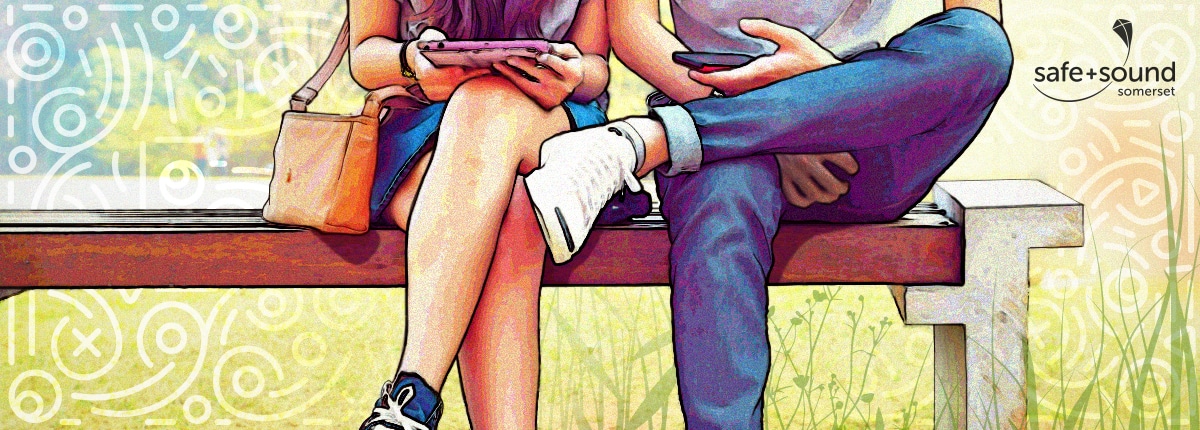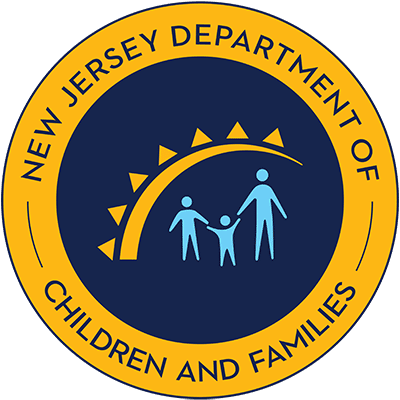A blog post listing tips for having continuous conversations with teens in your life about abuse.
Calling all parents, teachers, and professionals with teens in their lives!
February is Teen Dating Violence Awareness Month (TDVAM), so it’s the perfect time to strike up a conversation with your teen.
Teens frequently ask us, “Why don’t adults take our romantic relationships seriously?” Just as teens are moving towards adulthood physically and intellectually, changing friendships and first romantic relationships can be important to adolescent development. Taking your cues from the teen in your life, these milestones can present opportunities for adults to share information and knowledge.
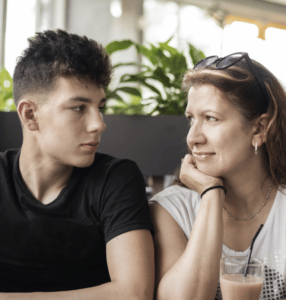
Teens often know the basics of what makes a healthy or unhealthy (or “toxic”) relationship, but do they know when to reach out for help? Do they know how to set clear boundaries with friends and dating partners? Do they know the early warning signs of an increasingly unsafe relationship? In a world of thousands of messages from social media, movies, television, their friends, and adults like you, maybe not. You can be a reliable source of information and comfortable place for them to ask questions.
One of Safe+Sound Somerset’s goals is to make teens aware that there is help and hope available for anyone feeling unsafe in a relationship. Anyone (including concerned adults) can reach out to our 24/7 call or text hotline at 866-685-1122 for supportive listening, safety planning, information, and connection to free services.
Frequently Asked Questions by Adults
- “What is teen dating abuse?”
- Abuse is a pattern of behaviors used to gain power and control over another person in a dating relationship. Teen dating abuse has real, often long-term effects with similar dynamics as domestic violence with adults. For more information about dating abuse in general, see “Teen Dating Abuse is Real and a Problem.”
- “How serious is teen dating abuse, really?”
- 1 in 3 American teenagers will experience violence from a dating partner before high school graduation (i), or about 33% of your local high school. This includes all definitions of dating, in-person or online, casual or serious.
- Relationships mean a lot to teens, even if you have your own doubts. It’s important to recognize that dating violence is definitely happening around you, so having conversations with teens is essential. You can listen, connect teens to services, and help prevent future abuse from happening.
- “I’m not sure if my teen is even dating yet, or if their relationship could really make that much of a difference in their life.”
- Whether or not your teen is dating, it’s very likely that your teen, whether in middle or high school, already knows someone who is currently experiencing or has experienced violence from a partner. It’s never too early to start talking about healthy relationships.
Warning Signs of Dating Abuse Include:
- Being anxious if they can’t constantly respond back to their partner; fearful of their partner’s reactions in general
- Increased isolation from family and/or friends; saying their partner doesn’t approve of people in their life
- Changing the way they dress or act
- Withdrawal from usual hobbies or activities
- Giving unusual explanations for past or current injuries or bruises
- Making excuses and apologizing for their partner’s behavior
- Depression, anxiety, self-harm, suicidal ideation
For more warning signs of abuse, see this page from The National Domestic Violence Hotline.
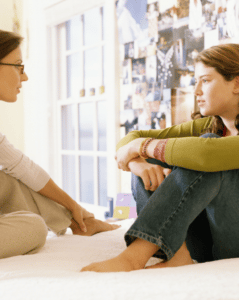
Communication Do’s
- Speak early, speak openly, and speak frequently. Teen dating abuse starts as soon as dating starts – this could be as early as late elementary school.
- Understanding what makes a healthy relationship is key to understanding an unhealthy relationship. Teens tell us they already know what makes a healthy relationship, but it’s important that they can also clearly describe why something is healthy or unhealthy. An easy way to explain this and set boundaries is using a Rights and Responsibilities framework.
Rights are things that cannot be taken away and are given, and responsibilities are jobs we have towards our partners. Each person in the relationship follows these to maintain healthy, equal relationship. See our Rights and Responsibilities framework here.
- Discuss consent and the law; adjust language depending on age. Dating violence of all kinds has consequences. For example:
-
- The NJ age of legal consent is 16 years old. 13 – 15 year-olds can only consent to sexual activity with people who are within 4 years older than they are.
- If an adult has sex with a minor who is under 16 and not within 4 years of age, they can be charged with statutory rape, even if the activity is done with consent.
- “Sexting” in NJ – Possession or distributing/sharing of nude pictures of a minor is illegal, and could be charged as possession of child pornography.
- Even if the pictures are “selfies” and consented to!
- Even if both people are teens who are dating!
- If both parties are 18 or over, it could be considered harassment if pictures are shared without consent, or are provided under pressure.
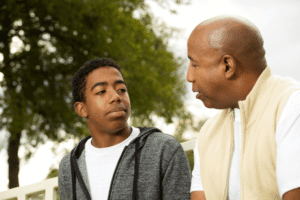
Conversation Starters
- What’s a healthy way to fight? Can you think of a time you would have fought differently?
- Who’s someone you know that has an unhealthy relationship? Why?
- Whose relationship would you like your relationships to be like? Why?
- What can you do if someone threatens you, or pressures you to do something you’re uncomfortable with?
- What are some relationship “rules” or expectations you’ve heard about? How might they contribute to an unhealthy or healthy relationship?
Key Discussion Points
- Love should feel good! Love is NOT jealousy, abuse, or violence (or a threat of violence)
- Impact > intent – in relationships, teens and adults must consider the impact of their actions.
- EVERYONE deserves to be treated equally in their relationships.
- Just because it’s in the media or happening in a friend group, doesn’t mean it’s healthy.
- Just because everyone does it, doesn’t mean everyone should be doing it.
- It’s never too late (or early) to talk about healthy relationships and dating abuse.
Find more resources at Break the Cycle and LoveIsRespect, which are both dedicated to engaging and empowering young people to seek healthy relationships and end abusive relationships.

Check out our podcast, Ask Ava, for teens and those who care for them. Every week, we answer a question from local teens about relationships. Throughout February, we are answering questions about Teen Dating Violence, myths, and how to get help.
Safe+Sound Somerset is Somerset County’s leading domestic violence organization. S+SS offers a 24/7 hotline: 866.685.1122. Call or text us for information, support, and at-no-charge services including safety planning, and individual and group counseling for teens and adults. Services are provided free of charge, in a confidential and culturally sensitive environment.
Source:
(i) Haynie, D.L. et al. (2013). Dating Violence Perpetration and Victimization among US Adolescents: Prevalence, Patterns, and Associations with Health Complaints and Substance Use. Journal of Adolescent Health 53(2), 194-201.
